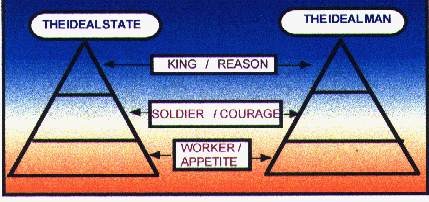|
Classical Greece-- 500 BCE:
|
||||||||||||||
|
The Mimetic theory
Chain of being: Ideas (the forms) Matter the Maker (Timaeus) universal soul nature Art imitates_____? Plato - poet is father of lies: 3x's removed from the truth (but Socratic irony) Forms above matter: does the poet imitate the matter or the idea? Aristotle: formal, material, efficient and final cause" the Poetics: the forms are "in" matter..."Tragedy is the imitation of an action..." Soul of tragedy is plot (dramatization of universals) occasioning pity and fear (catharsis) |
The views of history:
1-theocentric (God centered) Plato and the soul: |
|||||||||||||
 |
||||||||||||||
| Ideas from the Greeks:
"Man is the measure of all things" (Protagoras) |
||||||||||||||
| The Anglo-Saxon Period--to 1066: | The Medieval Period--1066 to 1485: | |||||||||||||
| The journey archetype:
Beowulf Beowulf as song: "The mightiest mead hall made by man...[was] menaced by the marauding monster." A society in flux...pagan to Christian values. Three moments of greatness in the life of a man. Beowulf as pagan and/or Christian the problem of age...the tragedy is to be alive at the time (Tolkien) The role of the scop...oral tradition: poet and historian: Values: honor, courage, loyalty, military values (comitatus code) of honor, revenge, Star Trek fans: think Klingons The danger of exile: The Wanderer and The Seafarer |
Chain of being:
God ? Angels ? Man Animals Plants Rocks |
Sociology of the chain...more links will be added: see Chaucer's Monk's Tale.
(What has to be added to the chain?) .Man unique on chain: -soul yearns for God (Up) -body yearns for world (Down)- -form (idea) is UP on the chain Chain defines moral perspectives: -Up in the chain is good (realism) -Down is bad (nominalism) -FAITH is UP on the chain |
||||||||||||
|
Medieval philosophy: Metaphysics--what is really real? Epistemology--how do we know reality? Morality--values, aesthetics--good/evil Problems in Medieval philosophy: -the one and the many / plenitude -must God create? (how much) |
||||||||||||||
| Authors and influences: Chaucer: the father of English poetry uses the chain (modified) in the Canterbury Tales Aristotle's logic --deduction and the Summa. |
||||||||||||||
| The Renaissance--1485-1603: | ||||||||||||||
| The pragmatic theory --Sidney's Apology for Poetry:
Diversity of Knowledge...beginnings of discipline--theology becomes: The CHAIN CONTINUES..but in revolutionary times |
||||||||||||||
| With the rise of science, nominalism is outpacing realism: moral implications?
--how do we know God?... |
Authors:
Sidney--the sonnet and sonnet sequence, and literary criticism The 'golden age of drama'-Shakespeare and Marlowe |
|||||||||||||
| The Seventeenth C.--1603-1660: | The Neo-Classical Period--1660-1789: | |||||||||||||
| Continuation of the Renaissance, but NO CHAIN OF BEING... -the execution of Charles and the Cromwell protectorate Age of confusion and paradox: SCHOOLS: |
THE CHAIN IS BACK, BUT THIS TIME BASED. ON....? (See Pope's Essay on Man) Names for the Period: Buzz words: Recall above (classical model of the soul)-the 'best of all worlds' now, but...? Authors: |
|||||||||||||
| The Romantic Period--1798-1832: | The Victorian -Modern Period--1832-__: | |||||||||||||
| Rooted in paradox...the chain is gone
The expressive theory...what or who is imitated? Buzz words:
Authors: -Rousseau--father of Romanticism (but see Neo-Classical period) The Dark side of Romanticism (Gothic) |
The Victorian Period: 1832-1901 They KNEW they were different. Why? Philosophy: of what knowledge is of most use? (utility--greatest good for greatest number: Ethics--how to manage leisure time Authors: -Dickens...the age of the novel: Hard Times -Arnold (realist): Dover Beach -Browning: My Last Duchess-dramatic monologue The Modern Period 1901-20__): The information age: google.com 1-modern man...T.S. Eliot--The Hollow Men and The Love Song of J.Alfred Prufrock. 2-the journey archetype--Heart of Darkness 3-the novel of controversy: The DaVinci Code 4-The novel of introspection; Henry James 5-the best seller : Harry Potter |
|||||||||||||
